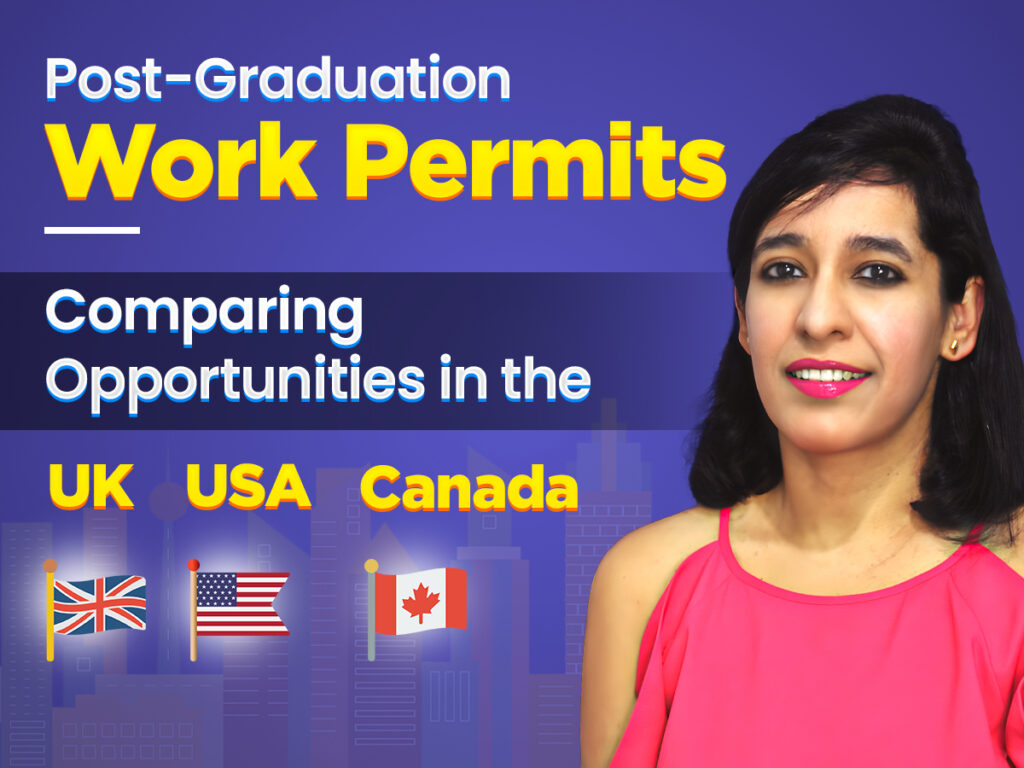This comprehensive guide will explore and compare post-graduation work permits in the UK, USA, and Canada, focusing on eligibility, duration, and benefits.
Introduction to Post-Graduation Work Permits
Post-graduation work permits, also known as graduate visas or post-study work visas, are temporary work permits granted to international students upon completing their studies. These permits allow graduates to stay and work in their country of study for a specified period, typically ranging from one to three years. The eligibility criteria, application process, and benefits vary across different countries.

Detailed Comparison of Post-Graduation Work Permits
UK Post-Graduation Work Permit
Eligibility and Application Process
International students who have completed an undergraduate or postgraduate degree in the UK are eligible for the Graduate Route visa. The application process is entirely digital. Applicants must start their application on the UK government website, create a UK Visas and Immigration account, and use the UK Immigration ID Check app to verify their identity.
Duration and Benefits
The Graduate Route visa allows students to stay in the UK for an additional two years after graduation to work or look for work. Doctoral students can stay for three years. There is no need to have a job secured or meet a minimum salary requirement.
USA Post-Graduation Work Visa
Eligibility and Application Process
International students on an F-1 visa can engage in practical training either during their degree (Curricular Practical Training – CPT) or after graduation (Optional Practical Training – OPT). OPT allows students to work for up to 12 months after graduation, and the work must be related to their field of study.
Duration and Renewal Options
OPT is valid for 12 months, but STEM (Science, Technology, Engineering, and Mathematics) graduates may be eligible for a 24-month extension, allowing them to work in the USA for a total of 36 months. This extension is particularly beneficial for students in tech-related fields, where demand for skilled workers is high.
Canada Post-Graduation Work Permit
Eligibility and Application Process
International students who have graduated from a designated learning institution (DLI) in Canada may be eligible for a Post-Graduation Work Permit (PGWP). The permit’s duration depends on the length of the study program, with a maximum validity of three years.
Pathways to Permanent Residency
The Canada post-graduation work permit PGWP can be a stepping stone towards permanent residency in Canada. Graduates can use their Canadian work experience to apply for permanent residence through various immigration programs, such as the Express Entry system.
Comparing Post-Graduation Work Permits in the UK, USA, and Canada
| Aspect | UK | USA | Canada |
| Eligibility | Must have completed a degree in the UK | Must have an F-1 visa; apply for OPT | Must graduate from a designated learning institution (DLI) |
| Duration | 2 years (3 years for doctoral graduates) | Up to 12 months (24 months for STEM OPT) | Up to 3 years, depending on program length |
| Job Requirements | No job offer required | Job must relate to field of study | No job offer required |
| Pathway to PR | Possible through other visa routes | Limited; may require H-1B sponsorship | Direct pathway through PGWP and Express Entry |
| Application Process | Digital application via UK government site | Apply for OPT through USCIS | Apply within 180 days of graduation |
| Additional Notes | Flexible work options; no minimum salary | Must secure a job within 90 days of graduation; employment must be related to major | Work experience can lead to permanent residency |
Cost of Living and Financial Considerations
When comparing the cost of living and tuition fees in the UK, USA, and Canada, it’s essential to consider various factors:
Tuition Fees
- UK: Tuition fees for international students can range from £10,000 to £38,000 per year.
- USA: Tuition fees typically range from $20,000 to $60,000 per year for international students, depending on the institution.
- Canada: Tuition fees generally range from CAD 7,000 to CAD 29,000 per year.
Cost of Living
- UK: The average cost of living is approximately £12,000 to £15,000 per year.
- USA: The cost of living varies widely, averaging around $10,000 to $25,000 annually, with major cities like New York being more expensive.
- Canada: The average cost of living ranges from CAD 10,000 to CAD 15,000 annually.
Financial Aid
- UK: Offers scholarships like the Chevening Scholarships.
- USA: Provides various scholarships and financial aid options, though they can be competitive.
- Canada: Offers programs like the Vanier Canada Graduate Scholarships.
Career Prospects and Job Market
The job market and career opportunities for international graduates vary significantly between the UK, USA, and Canada.
- UK: Competitive job market, especially in finance and technology, with higher costs in cities like London.
- USA: Robust job market, particularly in tech and healthcare, but often requires employer sponsorship for work visas post-graduation.
- Canada: Growing job market with high demand for skilled workers, particularly in technology and healthcare, and a direct pathway to permanent residency through the PGWP.
Visa and Immigration Policies
Visa and immigration policies are critical considerations for international students.
- UK: Recent changes allow graduates to remain in the country for two years without needing a job offer.
- USA: Offers OPT for post-graduation work, but transitioning to long-term employment often requires employer sponsorship.
- Canada: Provides a straightforward pathway to permanent residency through the PGWP.
Health and Well-Being Services
Both the UK and Canada provide comprehensive health care services for international students.
- UK: International students pay an immigration health surcharge for access to the NHS.
- USA: Health insurance is essential, and many universities offer plans for international students.
- Canada: Health care varies by province, but many provinces offer health insurance plans for international students.
Housing and Accommodation
Housing options for international students differ between the UK, USA, and Canada.
- UK: On-campus housing costs range from £500 to £1,200 per month.
- USA: On-campus housing is available but can be limited; off-campus living costs range from $800 to $2,500 per month.
- Canada: On-campus housing is generally more affordable, costing between CAD 500 and CAD 1,000 per month.
Integration and Community Support
Support systems for international students play a vital role in their overall experience.
- UK: Dedicated international student offices provide resources and social events.
- USA: Universities offer support services, including visa guidance and cultural adjustment workshops.
- Canada: Extensive support services include mentorship programs and cultural events.
Legal and Administrative Requirements
Understanding the legal and administrative requirements for studying and working in each country is crucial.
- UK: Students must apply for the Graduate Route visa before their student visa expires.
- USA: Students must apply for OPT before completing their degree and maintain their F-1 status.
- Canada: Students must apply for the PGWP within 180 days of graduation.
Conclusion
Post-graduation work permits in the UK, USA, and Canada offer international students valuable opportunities to gain work experience, build their careers, and potentially secure permanent residency.
For more information and personalized guidance on studying abroad, explore YOUR KNOWLEDGE BUDDY today!
Catch me on LinkedIn | Instagram | YouTube
FAQs
1. What is the eligibility criteria for post-graduation work permits in the UK?
International students who have completed an undergraduate or postgraduate degree in the UK are eligible for the Graduate Route visa.
2. How long can I stay in the USA on an OPT visa?
You can stay in the USA for up to 12 months on an OPT visa. STEM graduates may be eligible for a 24-month extension, totaling 36 months.
3. Can I apply for permanent residency in Canada with a PGWP?
Yes, the PGWP can be a pathway to permanent residency through programs like the Express Entry system.
4. What are the job requirements for post-graduation work permits in the UK and Canada?
In the UK, no job offer is required. In Canada, no job offer is needed to apply for the PGWP.
5. How do tuition fees and living costs compare between the UK and Canada?
Tuition fees in the UK range from £10,000 to £38,000 annually, while in Canada, they range from CAD 7,000 to CAD 29,000. Cost of living is generally higher in the UK compared to Canada.

